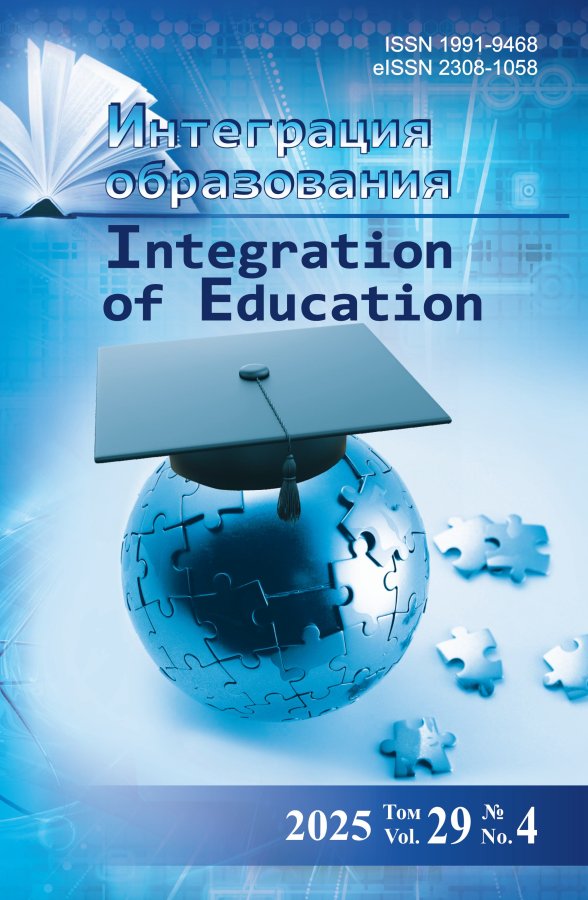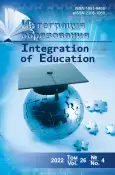Модель формирования образовательного профиля «Алмаз личности» для развития образовательной активности учащихся
- Авторы: Кушнир М.Э.1, Рабинович П.Д.1, Заведенский К.Е.1
-
Учреждения:
- Российская академия народного хозяйства и государственной службы при Президенте Российской Федерации
- Выпуск: Том 26, № 4 (2022)
- Страницы: 637-654
- Раздел: Модернизация образования
- Статья получена: 19.05.2025
- Статья одобрена: 19.05.2025
- Статья опубликована: 21.12.2022
- URL: https://bakhtiniada.ru/1991-9468/article/view/292436
- DOI: https://doi.org/10.15507/1991-9468.109.026.202204.637-654
- ID: 292436
Цитировать
Полный текст
Аннотация
Введение. Реализация стратегических приоритетов развития образования России, а также изменяющиеся запросы заинтересованных участников образовательного процесса актуализируют вопросы о результатах деятельности образовательных организаций, способах их измерений, а также о современных практиках управления образованием. Использование только нормативного и критериального оценивания не позволяет достичь ключевого востребованного образовательного результата – активного поведения ученика (образовательной субъектности), поскольку требует иных подходов к организации учебной деятельности, построения коллективно-индивидуальных образовательных маршрутов, создания возможностей для самоопределения и самореализации ученикам и учителям. Цель статьи – описание модели, отражающей образовательные результаты как личностный потенциал по ряду параметров разной направленности.
Материалы и методы. В ходе кабинетного исследования отечественных и зарубежных источников анализировались образовательные практики оценивания и результаты образовательного процесса с целью формирования новой модели с учетом современных запросов общества и выявленных неудач.
Результаты исследования. Авторы при рассмотрении различных подходов к оценке образовательных результатов, с акцентом на анализ неудачных моделей, сформулировали простой критерий применимости инструментов оценки – «сложность инструмента не должна превышать заинтересованности в его результатах». Предлагаемая модель претендует на разумный баланс сложности и информативности: с одной стороны, структура параметров многоуровневая, с другой – наглядно визуализирована в виде октаэдра – кристалла алмаза, а выбор на каждом уровне простой, в виде дихотомии, что позволяет ее считать индикаторной. Данная модель ориентирована на содержательную образовательную навигацию с отчуждением формальной части в виде основы простого образовательного профиля.
Обсуждение и заключение. Сделанные авторами выводы вносят вклад в развитие инструментария оценки образовательного результата, ориентированного на активное образовательное поведение и использующего цифровую среду при мониторинге и учете. Материалы статьи могут быть полезны педагогам и администраторам, интересующимся не только традиционным признаком соответствия итоговым испытаниям, но и развитием образовательной субъектности, поддерживающим и развивающим активность учеников.
Об авторах
Михаил Эдуардович Кушнир
Российская академия народного хозяйства и государственной службы при Президенте Российской Федерации
Email: kushnir.me@gmail.com
ORCID iD: 0000-0001-8632-5241
младший научный сотрудник Центра проектного и цифрового развития образования
Россия, г. МоскваПавел Давидович Рабинович
Российская академия народного хозяйства и государственной службы при Президенте Российской Федерации
Автор, ответственный за переписку.
Email: pavel@rabinovitch.ru
ORCID iD: 0000-0002-2287-7239
Scopus Author ID: 57188748346
ResearcherId: N-7024-2015
заместитель директора Школы антропологии будущего, кандидат технических наук, доцент
Россия, г. МоскваКирилл Евгеньевич Заведенский
Российская академия народного хозяйства и государственной службы при Президенте Российской Федерации
Email: kirillzav3@gmail.com
ORCID iD: 0000-0001-7379-4639
Scopus Author ID: 57197808231
заведующий лабораторией проектного и цифрового развития образования Школы антропологии будущего
г. МоскваСписок литературы
- Преадаптация школьников к инновационной деятельности и образовательные практики работы с будущим / П. Д. Рабинович [и др.] // Образование и наука. 2021. Т. 23, № 2. С. 39–70. doi: https://doi. org/10.17853/1994-5639-2021-2-39-70
- Исследование представлений директоров российских школ о цифровых компетенциях участников образовательной системы / А. А. Дерябин [и др.] // Вопросы образования. 2021. № 3. С. 212–236. doi: https://doi.org/10.17323/1814-9545-2021-3-212-236
- Образовательная логистика в цифровой школе / М. Э. Кушнир [и др.] // Информатика и образование. 2019. № 9. С. 5–11. doi: https://doi.org/10.32517/0234-0453-2019-34-9-5-11
- Hamim T., Benabbou F., Sael N. Survey of Machine Learning Techniques for Student Profile Modeling // International Journal of Emerging Technologies in Learning (iJET). 2021. Vol. 16, no. 04. P. 136–151. doi: https:// doi.org/10.3991/ijet.v16i04.18643
- Образовательный профиль студента как инструмент персональной образовательной логистики / М. Э. Кушнир [и др.] // Высшее образование в России. 2021. Т. 30, № 12. С. 48–58. doi: https://doi. org/10.31992/0869-3617-2021-30-12-48-58
- Асмолов А. Г. Персонализация образования и антропология будущего // Народное образование. 2021. Вып. 3. С. 75–82. URL: https://narodnoe.org/journals/narodnoe-obrazovanie/2021-3/personalizaciya- obrazovaniya-i-antropologiya-budushego- (дата обращения: 31.08.2022).
- Asmolov A. G. Anthropology of Everyday: Transformation of Human Behavior under Technological and Social Change // Lurian Journal. 2021. Vol. 2, no. 1. P. 6–18. URL: https://lurian.urfu.ru/ojs/index.php/lurian/ article/view/25/21 (дата обращения: 31.08.2022).
- Эльконин Б. Д. Продуктивное Действие // Культурно-историческая психология. 2019. Т. 15, № 1. С. 116–122. doi: https://doi.org/10.17759/chp.2019150112
- Сериков В. В. Опыт научно-педагогической школы личностно-развивающего образования // Вестник Воронежского государственного университета. Серия: Проблемы высшего образования. 2018. № 2. С. 11–18. URL: http://www.vestnik.vsu.ru/pdf/educ/2018/02/2018-02-02.pdf (дата обращения: 31.08.2022).
- Глухов П. П., Ешматов Я. А., Попов А. А. Образование будущего: освоение планет // Образовательная политика. 2019. № 4 (80). С. 118–126. URL: https://edpolicy.ru/planet-exploration (дата обращения: 31.08.2022).
- Глухов П. П., Попов А. А., Аверков М. С. Контуры нового антропологического проекта образования // Вестник Томского государственного университета. Философия. Социология. Политология. 2021. № 60. С. 45–54. doi: https://doi.org/10.17223/1998863X/60/5
- Herrera D. Perspectiva de Tiempo Futuro y su relevancia motivacional en distintos contextos educativos // Propósitos y Representaciones. 2019. Vol. 7, no. SPE. doi: https://doi.org/10.20511/pyr2019.v7nSPE.348
- Комаров Р. В., Ковалева Т. М. Персонализация образовательного процесса: 3D-пространство интерпретаций // Вестник МГПУ. Серия: Педагогика и психология. 2021. № 1. С. 8–22. doi: https://doi. org/10.25688/2076-9121.2021.55.1.01
- Alamri H. A., Watson S., Watson W. Learning Technology Models that Support Personalization within Blended Learning Environments in Higher Education // TechTrends. 2021. Vol. 65. P. 62–78. doi: https://doi. org/10.1007/s11528-020-00530-3
- Российские и международные практики работы с образовательными запросами / П. Д. Рабинович [и др.] // Интеграция образования. 2021. Т. 25, № 4. С. 629–645. doi: https://doi.org/10.15507/1991- 9468.105.025.202104.629-645
- Little D. The European Language Portfolio: Time for a Fresh Start? // International Online Journal of Education and Teaching (IOJET). 2016. Vol. 3, no. 3. C. 162–172. URL: https://iojet.org/index.php/IOJET/article/ view/146 (дата обращения: 31.08.2022).
- Engeness I. Teacher Facilitating of Group Learning in Science with Digital Technology and Insights into Students’ Agency in Learning to Learn // Research in Science & Technological Education. 2020. Vol. 38, no. 1. P. 42–62. doi: https://doi.org/10.1080/02635143.2019.1576604
- Sevtap G., Emma S. Children’s Agency in Parent – Child, Teacher – Pupil and Peer Relationship Contexts // International Journal of Qualitative Studies on Health and Well-being. 2018. Vol. 13, issue 1. doi: https:// doi.org/10.1080/17482631.2019.1565239
- The Agency Effect: The Impact of Student Agency on Learning, Emotions, and Problem-Solving Behaviors in a Game-Based Learning Environment / M. Taub [et al.] // Computers & Education. 2020. Vol. 147. doi: https://doi.org/10.1016/j.compedu.2019.103781
- Kirby P. Children’s Agency in the Modern Primary Classroom // CHILDREN & SOCIETY. 2020. Vol. 34, issue 1. P. 17–30. doi: https://doi.org/10.1111/chso.12357
- Almusharraf N. M., Bailey D. Online Engagement during COVID-19: Role of Agency on Collaborative Learning Orientation and Learning Expectations // Journal of Computer Assisted Learning. 2021. Vol. 37, issue 5. P. 1285–1295. doi: https://doi.org/10.1111/jcal.12569
- Delaney D., Kummer T. F., Singh K. Evaluating the Impact of Online Discussion Boards on Student Engagement with Group Work // British Journal of Educational Technology. 2019. Vol. 50, issue 2. P. 902–920. doi: https://doi.org/10.1111/bjet.12614
- Impact of Student Agency on Learning Performance and Learning Experience in a Flipped Classroom / H. Luo [et al.] // British Journal of Educational Technology. 2019. Vol. 50, no. 2. P. 819–831. doi: https://doi. org/10.1111/bjet.12604
- McDonough K., De Vleeschauwer J., Crawford W. J. Exploring the Benefits of Collaborative Prewriting in a Thai EFL Context // Language Teaching Research. 2019. Vol. 23, issue 6. P. 685–701. doi: https://doi. org/10.1177/1362168818773525
- Montenegro A. Why Are Students’ Self-Initiated Contributions Important (?) A Study on Agentic Engagement // International Journal of Sociology of Education. 2019. Vol. 8, no. 3. P. 291–315. doi: https://doi. org/10.17583/rise.2019.4540
- Gikandi J. W. Towards a Theory of Formative Assessment in Online Higher Education // Learning and Performance Assessment: Concepts, Methodologies, Tools, and Applications. IGI Global, 2020. P. 1637–1661. doi: https://doi.org/10.4018/978-1-7998-0420-8.ch076
- Kim M. K., Ketenci T. Learner Participation Profiles in an Asynchronous Online Collaboration Context // The Internet and Higher Education. 2019. Vol. 41. P. 62–76. doi: https://doi.org/10.1016/j.iheduc.2019.02.002
- Степанов С. Ю., Семенов И. Н. Психология рефлексии: проблемы и исследования // Вопросы психологии. 1985. № 3. С. 31–40.
Дополнительные файлы











